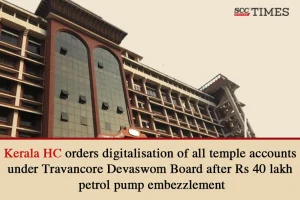Kerala High Court: The present Devaswom Board Audit Report (‘Audit Report’) was filed by the Joint Director, Kerala State Audit Department, Travancore Devaswom Board (‘Board’) , on the petrol pump embezzlement of nearly Rs 40 lakh at Swamy Ayyappa Fuels. The Division Bench of Raja Vijayaraghavan V.* and K.V. Jayakumar, JJ., noting that the Board administered approximately 1250 temples, directed it to submit a comprehensive report outlining concrete steps taken to fully computerise the accounts of all the institutions under its administration.
Background
An embezzlement was detected at the petrol pump run by the Board at Nilakkal under the name ‘Swamy Ayyappa Fuels’. As per the Audit Report, there were serious irregularities in fuel stock management. The daily sales receipts, collection registers, remittance details, and the initial readings of each dispensing nozzle were recorded only in an unofficial handbook, which was not even produced for audit verification. The stock register balances were being prepared based on the daily sales register, without independent verification. Therefore, in the absence of proper official records, the auditors had to rely on the periodic inspection report of Indian Oil Corporation Limited (‘IOCL’) conducted at the Nilakkal Fuel Station.
The machine readings recorded by the IOCL revealed that even after accounting for tank variation and evaporation loss of 705 litres, there remained a discrepancy of 6,987 litres in the quantity of High-Speed Diesel (‘HSD’) sold during the relevant period. Further, no cash receipts were provided to customers, and no proper records were maintained to reconcile the sales with the machine readings.
Consequently, disciplinary proceedings were initiated against the employees for misappropriation and embezzlement of an amount of approximately Rs 40 lakh. The Joint Director made various recommendations, including the urgent implementation of a digital record-keeping system to track fuel sales, credit slips, and stock levels in real time.
Analysis and Decision
The Court, from its previous order dated 26-07-2023, found that the work was awarded to Keltron to carry out the computerisation for a total project cost of Rs 9,73,61,396. However, serious disputes arose, and the Court, based on the opinion given by the I.T. Mission, noted that the software was outdated and the methodology of development of software was not suitable. Thereafter, the Court directed the Board to take effective steps to carry out computerisation either with the original vendor or another competent agency.
The Court opined that the embezzlement detected at Sri. Ayyappa Fuels was evidence of the fact that the Board had failed to achieve the very objectives emphasised by this Court while disposing of the earlier matter. The magnitude of the laxity became stark when one considered that even privately-run fuel stations maintained proper digital accounting of their operations, whereas the Board, despite managing an institution of such scale and sanctity, had not implemented even the most basic safeguards.
The Court relied on A.A. Gopalakrishnan v. Cochin Devaswom Board, (2007) 7 SCC 482, wherein the Supreme Court had observed that “the properties of deities, temples and Devaswom Boards, require to be protected and safeguarded by their trustees, archakas, shebaits, or employees.”
The Court was shocked to see that a fuel pump catering to a large volume of vehicles was permitted to operate without proper accounting mechanisms or real-time monitoring systems and opined that this instance appeared to be merely the tip of the iceberg. The Court observed that such gross administrative negligence could not be allowed to persist when as early as 2015, clear and binding directions were issued mandating the complete computerisation of operations to prevent corruption, mismanagement and embezzlement, and to ensure transparency in both financial and administrative affairs.
The Court noted that there was a long delay in completing the statutory audit of various temples and institutions which was attributable to the failure to reconcile accounts and the continued dependence on outdated manual accounting processes. The Court observed that any further delay in implementing end-to-end computerisation would only serve to abet the continued misappropriation of funds by unscrupulous elements operating with impunity and such inaction would not only compromise the sanctity of temple administration but also gravely undermine public trust in the functioning of the Board.
The Court opined that financial irregularities could be brought to a stop, and systematic loss of income out of Devaswom assets and properties could only be prevented by adopting sound accounting practices, a pre-requisite of which was computerisation. The Court emphasised that if these institutions were administered efficiently and with full transparency, the legitimate generation of revenue would increase manifold, enabling better upkeep of temples and welfare activities for devotees.
The Court while listing the capabilities of the system, remarked that it was the Board’s duty to ensure that a comprehensive, fully functional, and tamper-proof software system of all the institutions governed by the Board was in place at the earliest, so that all revenues and expenditures were captured, monitored, and reconciled on a day-to-day basis.
The Court directed the Board to submit a detailed report outlining the specific steps taken to computerise the accounts of all institutions under its administration. The report must clarify whether the Board implemented a comprehensive End-to-End ERP system that fully digitalised its operations, including modules for accounting and audit, contracts and purchase management, procurement and tendering, HR and payroll, project and construction management, inventory control, and anti-corruption mechanisms. Additionally, the Court asked the Board to confirm whether the technology platform adopted was modern, cloud-hosted, microservices-based, and integrated with accounting software to enable seamless reconciliation.
The matter is now posted on 22-08-2025 for the Board’s report.
[Joint Director, Kerala State Audit Department v. The Secretary, Travancore Devaswom Board, 2025 SCC OnLine Ker 6097, decided on 08-08-2025]
*Order by: Justice Raja Vijayaraghavan V.
Advocates who appeared in this case:
For the Petitioner: Government Pleader
For the Respondents: Standing Counsel for Travancore Devaswom Board

